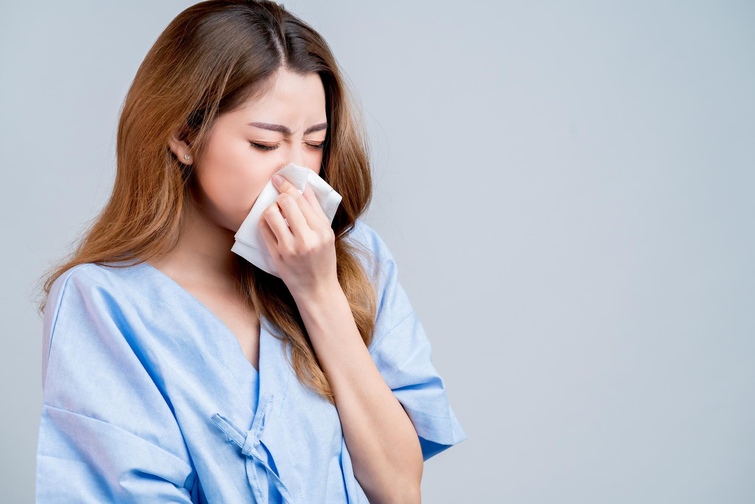
Sinusitis is a common condition that affects millions annually. It is characterized by inflamed and swollen sinuses that lead to pain, congestion, and other bothersome symptoms. Around 28.9 million adults, or 11.6% of adults, are diagnosed with sinusitis. Fortunately, there are effective home remedies to alleviate these symptoms. Let’s explore 10 simple and effective strategies to manage sinusitis at home and know when to seek help from urgent care in Stamford, CT.
What is Sinusitis
10 Home Remedies to Help Ease Sinusitis
When to Seek Urgent Care in Stamford, CT
Benefits of Urgent Care in Stamford, CT
Frequently Asked Questions (FAQs)
✔ There are several practical home remedies to manage sinusitis effectively, including staying hydrated, using steam inhalation, saline nasal sprays, avoiding allergens, and using a humidifier.
✔ Incorporating spicy foods can naturally help to clear nasal passages, while supplements like Vitamin C are crucial for boosting the immune system to combat sinusitis.
✔ Adequate rest is vital for recovery. It supports the body’s immune function and healing processes, helping to speed up recovery from sinusitis.
✔ Over-the-counter medications and nasal flushes like neti pots can provide immediate relief, but it is important to use these methods as directed to avoid complications.
✔ If symptoms persist, worsen, or are accompanied by a high fever or vision problems, it is crucial to seek professional medical attention at an urgent care in Stamford, CT.
✔ Urgent care in Stamford, CT, provides quick, cost-effective, and comprehensive care.
Sinusitis, a sinus infection, occurs when the cavities around your nasal passages become inflamed and swollen. This inflammation leads to an accumulation of mucus, blocking the sinuses and causing pain, drainage, and difficulty breathing.
Symptoms often include facial pain or pressure, nasal congestion, headache, and a reduction in the sense of smell and taste. Sinusitis can be triggered by infections, allergies, or any condition that impedes airflow through the sinuses. Urgent care in Stamford, CT, can provide additional guidance and treatment options for those struggling with persistent or severe cases.
Here are 10 effective home remedies recommended by urgent care in Stamford, CT, to help you manage and relieve the symptoms at home:
Hydration is crucial in managing sinusitis by thinning the mucus, which can help alleviate congestion and promote easier breathing. Here’s how you can effectively stay hydrated:
Steam inhalation is a simple, effective method to relieve sinus congestion quickly. Here’s how to properly use steam inhalation for sinus relief:
Saline nasal spray is an effective tool for moisturizing nasal passages and breaking up mucus, which can help clear congestion. Here’s how to use it effectively:
Limiting exposure to common allergens is vital in preventing sinusitis flare-ups. Here are key strategies to reduce allergens in your environment:
Using a humidifier can significantly alleviate sinus discomfort by maintaining optimal indoor humidity levels, preventing the nasal passages from drying out. Here’s how to effectively use a humidifier for sinus health:
Incorporating spicy foods into your diet can naturally alleviate congestion by opening up nasal passages. Here’s how spicy foods can be used to relieve sinus pressure:
Over-the-counter (OTC) medications can offer quick relief from sinusitis symptoms when used appropriately. Here are guidelines for using OTC medications effectively:
Vitamin C is crucial for immune system support, which can help reduce the duration of sinusitis symptoms. Here’s how to effectively incorporate Vitamin C into your regimen:
Adequate rest is essential for effective recovery from sinusitis, as it supports the body’s immune response and healing processes. Here’s how to ensure you get quality rest:
A nasal flush with a neti pot or similar device can effectively clear mucus and debris from your sinuses. Here’s a step-by-step guide to ensure a safe and effective nasal flush:

While home remedies can be effective for managing sinusitis, there are times when it’s crucial to seek professional medical advice. Urgent care in Stamford, CT, is well-equipped to assess and treat severe cases of sinusitis, ensuring you receive the most effective and appropriate treatment to help you recover swiftly. Here’s when you should consider visiting urgent care in Stamford, CT:
Sinusitis symptoms typically include nasal congestion, facial pain or pressure, and a runny nose. If these symptoms persist beyond 7-10 days without any sign of improvement, it could indicate that home remedies are insufficient for recovery.
It’s important to consult a healthcare provider for a thorough assessment. Urgent care in Stamford, CT, can evaluate your condition, possibly perform diagnostic tests like imaging studies, and recommend additional treatments such as prescription medications.
If initial mild symptoms of sinusitis, such as slight pain and congestion, escalate to more severe pain, increased green or yellow nasal discharge, or worsening overall discomfort, the infection may intensify or not respond to initial treatments.
Visit urgent care in Stamford, CT, to get evaluated for potential complications like a developing bacterial infection, which might require intervention such as prescription antibiotics or other targeted therapies.
A fever over 101°F (38.3°C) accompanying sinus symptoms is not typical for a common viral sinus infection and can indicate a bacterial infection. Bacterial sinus infections are more severe and require different management strategies.
Fever of this level suggests the need for professional medical treatment. Urgent care in Stamford, CT, can assess whether antibiotics or other specific treatments are necessary to combat the infection effectively.
Symptoms like swelling around the eyes, eye pain, blurred vision, or seeing double are serious and may suggest that the sinus infection has spread to the orbital area around the eye. This could lead to orbital cellulitis, a dangerous condition requiring prompt treatment. This is a medical emergency. Immediate evaluation at an urgent care in Stamford, CT, or an emergency department is crucial to prevent potentially serious complications, including permanent vision impairment.
Urgent care centers in Stamford, CT, offer numerous advantages for residents and visitors, providing a convenient and efficient alternative to traditional emergency rooms or waiting for a doctor’s appointment. Here are some key benefits:

Sinusitis can affect individuals of all ages, but certain groups are particularly susceptible. Those with allergies are prone because allergies can lead to swollen nasal passages that block sinuses. People with nasal polyps or anatomical variations in the nasal passages also have a higher risk, as do those with weakened immune systems, such as individuals suffering from immune deficiencies or those on immunosuppressive medications. Additionally, children are commonly affected by their less-developed immune systems and frequent exposure to pathogens in settings like schools.
Sinusitis is a common condition due to a combination of factors. Environmental allergens are widespread, and many individuals have allergies that trigger sinus inflammation. Furthermore, viral infections such as the common cold are frequent and can lead to sinusitis as a secondary complication. Anatomical factors like a deviated septum or narrow sinus openings can also contribute by trapping mucus and fostering bacterial growth.
Sinusitis is generally treatable with appropriate medical intervention. Treatments include antibiotics for bacterial sinusitis, decongestants, and nasal sprays. Home remedies like nasal irrigation and steam inhalation also prove beneficial. In cases of chronic sinusitis, particularly when caused by physical obstructions or polyps, surgery may be necessary to improve sinus drainage and function.
Sinusitis caused by viruses does not require antibiotics and can often be managed or cured with supportive care. This includes adequate rest to help the body fight the infection, staying hydrated to keep the mucous membranes moist, and using methods like steam inhalation and nasal irrigation to clear congestion. Over-the-counter pain relievers and decongestants can also alleviate symptoms. However, if symptoms persist for more than 10 days or worsen, it is important to consult a healthcare provider as the sinusitis may be bacterial in nature and require antibiotic treatment.
Looking for healthcare services that are customized to your unique needs? At DOCS Urgent Care Stamford, our team is ready to assist you. We are staffed with experienced physicians, specialists, and healthcare professionals committed to delivering personalized, high-quality care to individuals of all ages. With our state-of-the-art facilities and advanced technology, we are dedicated to providing an exceptional healthcare experience that prioritizes your health. See us today!



During this surge in COVID-19 cases, our primary focus is meeting the high demand for tests, and we are seeing higher than usual wait times. This means we are unable to answer most phone calls. Please know that our teams are working very hard during this time to care for as many patients as safely as possible. Please click the button below for answers to common questions. We appreciate your understanding.